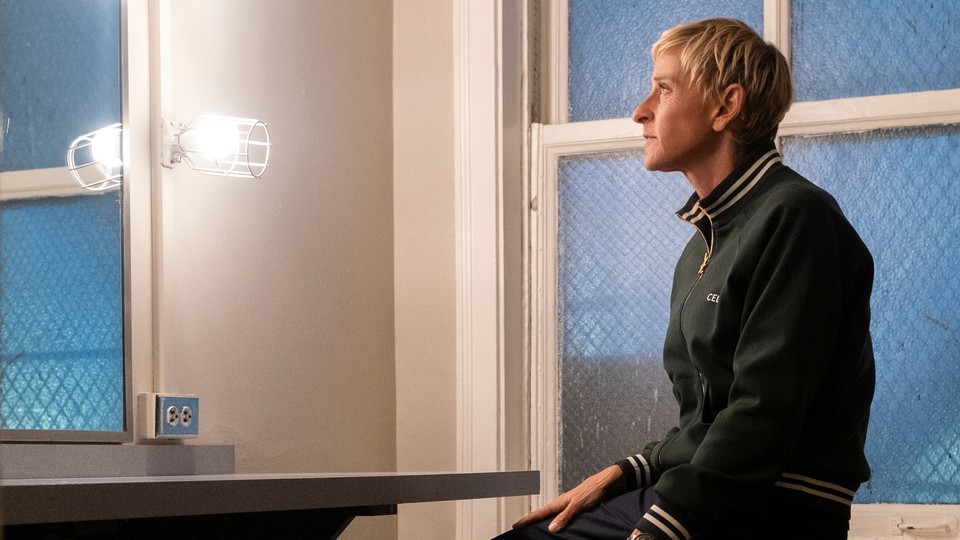Ellen DeGeneres Still Wants You to Love Her
5 min read
Ellen DeGeneres has been raising chickens. She loves those chickens, and the feeling, she thinks, is mutual. She watches them play on a little swing. It’s been two years since the comedian was last in the public eye, and she’s eager to chat about what she’s been doing in the interim. “Let me see what else I can tell you about that’s been going on,” she muses in her latest—and, according to her, last—stand-up special, Netflix’s For Your Approval. She’s stopped getting Botox injections, she notes. She looks to the theater ceiling for other answers; she briefly glances down at her shoes. Frowning, she takes out a crumpled bit of paper to a smattering of audience support. She looks up. “Oh yeah,” she deadpans. “I got kicked out of show business.”
After a warm wave of laughter and applause, DeGeneres specifies that the reason she was “kicked out”—a.k.a. deprived of her once-beloved, long-running talk show, following an image-damaging controversy—was that she was “being mean.” “You can’t be mean and be in show business,” she adds, with a wry shake of her head. The set-up prepares viewers for her culminating thoughts on a four-decade career. Capturing the final stop on her “Last Stand … Up” tour, the special functions as a defiant 70-minute coda, in which the comedian relishes the freedom to let herself off the hook.
For Your Approval’s scripted cold open, a common practice for filmed stand-up, is particularly telling. Scored by a twinkling piano, a montage shows highlights from her career: appearing for the first time on The TonightShow, coming out on her eponymous sitcom, voicing Finding Nemo’s Dory, hosting the Oscars. Then, the tone shifts; the music stops. “Breaking news tonight: Is the queen of nice really the queen of mean?” asks a newscaster-y voice. It’s an odd first note that infuses the special with an overwrought sentimentality while undercutting the question of how the comedian will address her fall from grace. By the time DeGeneres walks onstage, home viewers may already have a sense that she’s looking for sympathy more than laughs. The comedian may joke about her expulsion from Hollywood, but it’s clear how hurt she feels. And when it comes to owning her mistakes, DeGeneres struggles to find the humor.
The incidents serving as her source material date back to March 2020. DeGeneres faced a series of escalating social-media rumors about her purported “meanness,” toward both her show’s employees and celebrity guests. That July, current and former The EllenDeGeneres Show staffers made allegations about its workplace culture in a BuzzFeed News report; these ranged from pay inequity and intimidation tactics to microaggressions toward non-white employees. An Ellen spokesperson issued a statement expressing remorse and a commitment to “do better”; staffers followed up by alleging sexual harassment on and off set. (An investigation led to the departure of three executive producers.) The story continued to snowball: Other celebrities came out of the woodwork to share unflattering anecdotes, and #ReplaceEllen trended on Twitter. DeGeneres apologized—first to her staff, then to her audience and the public—and the show continued for 20 more months. But Ellen ended in May 2022, after 19 seasons and sharply declining ratings.
DeGeneres now approaches these allegations, somewhat surprisingly, with a jocular-seeming sense of pride. For being called “the most hated person in America,” she complains that there was “no trophy, no awards banquet, nothing.” This “sorry, not sorry” stance initially feels fitting for DeGeneres’s acerbic wit; she’s always pushed boundaries for the sake of a joke, no matter how small (or bad) the target. In the special, she receives some of her biggest laughs when she embraces her past behavior––sharing stories of chasing her employees and scaring them, only to realize, Wait, that doesn’t sound very good. These amusingly frank moments ring truer to DeGeneres’s style of comedy than the serious asides or justifications that soon follow.
Throughout For Your Approval, DeGeneres sidesteps any real soul-searching about her reported behind-the-scenes conduct. Instead, she makes cracks about her attention deficit disorder (which, she says, explains her short attention span and curt personality), obsessive-compulsive disorder (that’s why she’s ornery about things being correct), and insufficient qualifications for being anyone’s boss. “I don’t think Ronald McDonald’s the CEO of McDonald’s,” DeGeneres argues, implying that she sees herself more as a mascot than a leader. These bits start to knock the air out of how she talked about her actions earlier in the special: At their most self-aggrandizing, they warp the language of mental health to explain her failings within a workplace infrastructure.
DeGeneres may be right about her bad management skills, but these jokes suggest a lack of self-awareness. She was popular because she seemed kind, not because she seemed morally upstanding, but the abdication of responsibility clouds the comedy. She appears disconnected from why her staff and the public lost their faith in her, in moments even seeming ignorant about how she might have exploited her authority. It’s hard to imagine a viewer who’s unaware of the controversy coming away with any real sense of its stakes.
By the end of the set, DeGeneres appears to want to remember that more people love her than don’t. For Your Approval makes ample use of extended applause breaks, during which the comic soaks up her live audience’s attention; the longest of these cheers occurs when DeGeneres brings out her wife, a tearful Portia de Rossi. DeGeneres forgoes humor in these closing minutes to plead that she’s nothing if not human. It’s a request for grace that she doesn’t quite earn.



